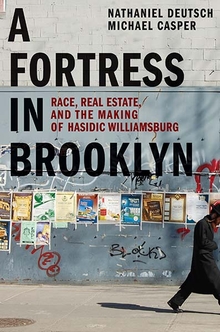People of the Blog
Nathaniel Deutsch and Michael Casper—
When the Yiddish-language Hasidic online chat forum Kave Shtibel (Coffee House) began a thread about our book, A Fortress in Brooklyn, less than two weeks after it was published in May, we were pleased but not surprised. The extensive Hasidic print culture that traditionally included newspapers and other publications has moved online to blogs, Facebook pages, Twitter feeds, and WhatsApp groups. All despite the efforts of religious leaders to prohibit community members from using the Internet except for business and other essential needs. Now Hasidim in Brooklyn and around the world can express themselves—often while dissenting from communal consensus—with the protection afforded by anonymity for both writers and readers. The Hasidic expansion into the virtual sphere over the past twenty years has been a remarkable departure from the community’s historical animus towards not only modern technology but innovation itself. Today, Hasidim who grew up in homes without televisions, let alone computers, now use smart phones and are fluent in the grammar of the Internet, producing thousands of comments on Kave Shtibel about matters sacred and profane, from new religious books to parking regulations and real estate.
With the recent success of “Unorthodox,” the screen adaptation of Deborah Feldman’s bestselling memoir of growing up in Hasidic Williamsburg, along with other books, films, and TV series about Hasidic life, it is important to keep in mind that Hasidim have always commented on portrayals of their community by outsiders. From the moment they arrived as Holocaust survivors and refugees after World War II, Hasidim in America, and especially those in Williamsburg, have been the subject of curiosity and scrutiny by anthropologists, sociologists, journalists, and other observers. While Williamsburg’s Hasidim are often treated as an uncontacted tribe, they have in fact been interviewed, analyzed, and administered psychological TAT (thematic apperception tests) for decades. “We are not an exotic lost tribe of Israel,” one community leader told the sociologist George Kranzler, “We are sober, hardworking people who want to live a decent, proper life.”
In 1955, LIFE magazine published an article calling Williamsburg’s Hasidim “carryovers from an archaic way of life” and “strange figures that seem to belong to another age.” Shortly thereafter, sociologist of Hasidic Williamsburg Solomon Poll noted the dissatisfaction with the article among his informants: “They felt that this article should have made fun of the nonobservant Jews who left the traditions of their forefathers, but instead it made fun of them.” At the same time, Hasidim sometimes appreciate how outsiders view them. One Hasidic young man who played for a Hasidic softball team and whom we interviewed for our book, compared his hobby favorably to the film version of Chaim Potok’s novel, The Chosen, about Hasidic baseball players in Williamsburg. Likewise, “Unorthodox” inspired a flood of commentary and criticism from Hasidim, most of it online. It has been gratifying to see Hasidim read our book and post observations and opinions in chatrooms, tweets, and emails to us. Our book, our commentary, is receiving a commentary of its own.
Nathaniel Deutsch is professor of history at the University of California, Santa Cruz. Among his books are The Maiden of Ludmir: A Jewish Holy Woman and Her World and The Jewish Dark Continent: Life and Death in the Russian Pale of Settlement, for which he received a Guggenheim Fellowship. Michael Casper received his Ph.D. in history from UCLA and has contributed to American Jewish History and the New York Review of Books.
Further Reading:



























